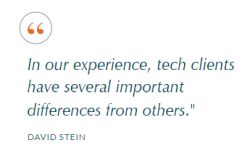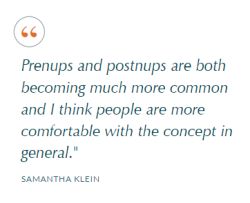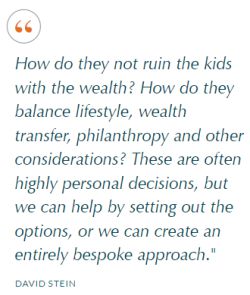They were gathered for a fireside chat with a winemaker. But the audience of about 50 technology founders had not attended Withers' San Francisco office solely to taste a Sonoma County zinfandel. The real draw was that the speaker, a prominent non-executive director and former tech CEO, would be discussing her learnings from a 20-year career in Silicon Valley.
"It was a really beneficial conversation and a great opportunity to share some collective wisdom," says Doug Mandell, global head of the founder practice at Withers. "We work with plenty of founders who are just starting out, but some of our clients are now entering into their next phase, selling their businesses and moving on to new things. I have been working with this particular client since 2006 and it's been so exciting to watch the arc of her career."

Since Withers arrived in California in 2015, the firm has built a reputation as the go-to firm for representing founders personally, pioneering a range of approaches to support them and their families throughout their lives and throughout the lifecycle of their company.
"In our experience, tech clients have several important differences from others," comments David Stein, a trust and estate planning lawyer who regularly assists founders. "They are creators rather than inheritors of wealth, and they tend to be relatively young when we start working with them. We've seen clients who have barely graduated from college and are still sleeping on friends' couches or renting apartments, working all hours and getting takeout. They may be worth a lot on paper, but it doesn't yet seem real to them."
Start planning earlier
Younger founders who are yet to start families, or have very young children, are usually focused on their business, rather than thinking about tax or estate planning. However, there are huge advantages to starting to put plans in place before businesses scale up significantly, and in particular before a transaction that suddenly makes the founder wealthy. For example, it makes sense to place some shares in a trust while the company has a smaller value, so that a larger amount of stock can become tax exempt.
"To maximize these advantages, we often suggest that clients' parents create a trust for them. The founder sells stock to the trust, which means it is out of their estate but still available to them as a trust beneficiary if needed later," says David. "Some of our older clients act as mentors to younger founders through the Y Combinator startup accelerator, and when they're asked for their advice, sometimes they say, 'I wish I had done the estate planning five years earlier, because it would have been so much more powerful'."
Taking the next step
As a business moves to a secure stage of growth, a founder's personal life will also be evolving. They are likely to buy property in California and around the world, while those who were born overseas may use their success to bring family members into the US.

Often, this is the phase when founders are thinking about getting married – a pivotal moment in anyone's life, but one that requires a little extra consideration for a company founder. While nobody wants to be thinking about divorce before a wedding has even taken place, co-founders, investors and advisors may want to consider putting measures in place to protect the business against the impact that a divorce could have on the capitalization table.
This is where Samantha Klein, head of Withers' family practice in California, often steps in. "Prenups and postnups are both becoming much more common and I think people are more comfortable with the concept in general," she says.
For founders, a marital agreement can be a way to protect their company, but also to shield their spouse from potential business liabilities. "You're really able to do both, and that's important," explains Samantha. "The downside is, how do you make promises and give agreements if you don't have a good sense of what's going to happen in your financial future? You could make promises that you aren't able to keep. Or if you're pre-IPO, someone could easily take advantage if you have to sell shares. That's an area where we need to be creative."
For founders, the task is to come up with an agreement that prepares for every possible scenario, while being clear enough for both sides to follow. In the event that a couple does decide to separate, a well-drafted agreement will take much of the hostility out of the divorce proceedings – allowing the kind of amicable approach taken by Jeff and Mackenzie Bezos..
These dignified divorces should serve as a blueprint for any other founders who want to protect their business, their reputation and their family, says Samantha. "It's very positive when high-profile people can think straight at that moment. [These couples] have clearly said that we don't want to involve the public, let's commit to doing this between us. Before anybody even files for divorce, let's agree on a settlement, paper it and then announce so that we control the narrative."
Starting a family office
Marriage and divorce are not the only matters that are more complicated for founders and their families than for others. As they experience more financial success, they are likely to have property and assets spread around the world. Many choose to establish a family office to help manage their lives, from handling investments and personal security to buying art, yachts and aircraft.

This is a time when they can begin to indulge their passions – whether they choose to start a new venture or, as in the case of the San Francisco speaker, buy a vineyard.
However, business people with families are often concerned about the impact on their children of growing up in privileged circumstances. "The questions that arise are, how do they talk to their kids about wealth?" says David. "How do they not ruin the kids with the wealth? How do they balance lifestyle, wealth transfer, philanthropy and other considerations? These are often highly personal decisions, but we can help by setting out the options, or we can create an entirely bespoke approach."
Here again, a family office can be useful – allowing the next generation to take on responsibility gradually, and with professional advice on hand.
"The final phase is the charities and nonprofit aspect," says Doug Mandell. "A lot of people want to give some of their wealth away and come to us asking, how do I do that? Does it make sense to start a foundation? Are there any other possibilities?"
This array of questions is typical, showing that founders do not simply switch off their innovative mindset when it comes to managing their family matters. "Tech founders are used to being agile in their professional lives, and they are the first to think outside the box in their own lives as well. They don't just want to do things the way they've been done in the past – they want to bring in their own solutions," concludes Doug. "And that is one of the reasons I love working with them."
The content of this article is intended to provide a general guide to the subject matter. Specialist advice should be sought about your specific circumstances.



